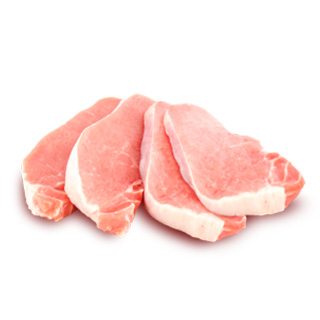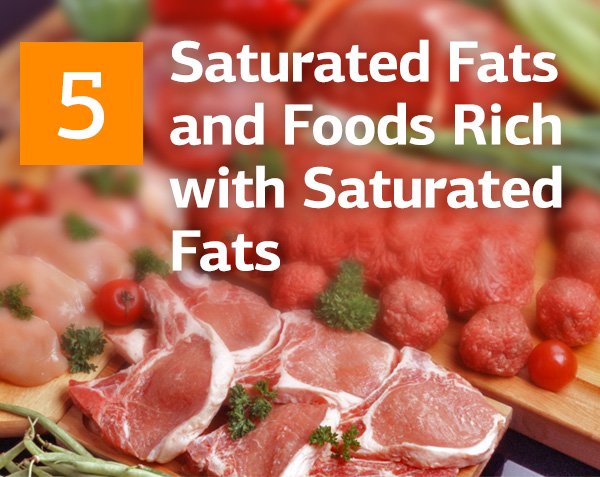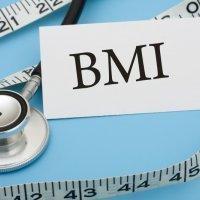Saturated Fats and Foods High In Saturated Fats
Although many people underestimate them, fats are as important in nutrition, as proteins and carbohydrates. They are one of the sources of vital energy and a building material for cellular membranes. One should not fully cut out all the fat: it has to make up at least 20% of a human diet. Fat takes part in many metabolic processes of human body and comprises at least 70% of the human brain.
So, fats should make up roughly one fifth of our daily allowance. How much is it in grams? The exact numbers depend on age, gender and lifestyle of each person. Young people may have more fats in nutrition, than those who are slightly over 50.
According to their chemical structure, all fats are divided into saturated and non-saturated. In the saturated fats, all the available chemical links are filled with atoms of hydrogen, that’s why they don’t react with the other chemical componds. In the non-saturated fats, atoms of hydrogen fill not all the links; moreover, their consistency is more soft and liquid. Unlike non-saturated fats, saturated ones remain solid under room temperature, which makes them easy to distinguish.
Saturated fats have the notorious reputation, because, due to their abundance in food, many people tend to overconsume them, which results in dangerous conditions. Saturated fats must comprise one third of the daily quantity of fats.
There are not so many sources of saturated fats, they are as follows:
1. Meat
 Types of Meat Rich in Saturated fat (100g):
Types of Meat Rich in Saturated fat (100g):
| Beef, Tenderloin, Steak, Separable Lean Only, Trimmed To 1/8 Fat, Choice | |
| 100 g | 1 lb (454 g) |
| Saturated fat: 2.6 g (13% DV) |
Saturated fat: 11.8 g (59% DV) |
| Pork, Fresh, Loin, Whole, Separable Lean Only | |
| Saturated fat: 2 g (10% DV) |
Saturated fat: 8.8 g (44% DV) |
| Game Meat, Caribou | |
| Saturated fat: 1.3 g (6% DV) |
Saturated fat: 5.9 g (29% DV) |
Meat (beef, pork, tallow, mutton, other kinds of meat and game). Meat of every kind ia also a unique source of all the indespensible aminoacids, digestible protein and some vitamins. Lean meat is preferable in terms of healthy nutrution, which has been confirmed by numerous studies. If for any reson you don’t eat meat, be sure to substitute it with dairy products or eggs. Meat is the prime source of saturated fats, because even the low-fat kinds of meat (for example, chicken) have hidden fat, which is hard to get rid of.
2. Eggs
 Types of Eggs Rich in Saturated fat (100g):
Types of Eggs Rich in Saturated fat (100g):
| Egg, Whole, Fresh | |
| 100 g | 1 medium (44 g) |
| Saturated fat: 3.1 g (16% DV) |
Saturated fat: 1.4 g (7% DV) |
Eggs. This is, probably, the most concentrated source of saturated fats. Although this product is a real powerhouse of minerals, amino acids and vitamins, it is only good in moderation. Overeating eggs may lead to severe allergies and radical increase of the cholesterol level. As for saturated fats, eating one egg per day is all you need to be sure you get enough of it.
3. Dairy Products
 Types of Dairy Products in Saturated fat (100g):
Types of Dairy Products in Saturated fat (100g):
| Milk, Fluid, 3.7% Milkfat | |
| 100 g | 1 cup |
| Saturated fat: 2.3 g (11% DV) |
Saturated fat: 5.6 g (28% DV) |
| Cream, Fluid, Heavy Whipping | |
| Saturated fat: 23 g (115% DV) |
Saturated fat: 54.8 g (274% DV) |
| Butter, Without Salt | |
| Saturated fat: 51.4 g (257% DV) |
Saturated fat: 116.6 g (583% DV) |
Dairy (milk, butter, cheese, cream and other milk products). Although some people believe, that milk is designated for babies only and adult people should nott consume it, there are no straight proofs of this point of view. On the contrary, doctors recommend to eat dairy, especailly fermented milk products, every day. The exception are people, allergic to lactose (milk sugar). If you feel nausea or any other unpleasant symptoms shortly after eating dairy, make test to check yourself for the lactose allergy. The prognosis is unpleasant – according to some statisics, more than 80% of population have more or less severy forms of lactose intolerance.
4. Exotic Butters And Oils

| Vegetable Oil, Palm Kernel | |
| 100 g | 1 tablespoon (14 g) |
| Saturated fat: 81.5 g (408% DV) |
Saturated fat: 11.1 g (55% DV) |
Exotic butters and oils (solid oils, such as palm oil). This is the most uncertain category of fats. Palm oil is very cheap, so it is often used in food industry, mostly as a substitute of other fats, e.g. milk fats. According to the global statistics, half of all products in packages include palm oil. It has a high level of vitamin A and saturated fats. Although its usefulness is doubted, moderate quantities of palm oil won’t do any harm to your health.
5. Hydrogenated Fats
| Margarine, Regular, Hard, Soybean (hydrogenated) | |
| 100 g | 1 tsp (5 g) |
| Saturated fat: 16.7 g (84% DV) |
Saturated fat: 0.8 g (4% DV) |
Hydrogenated fats (such as margarine). Margarine is the most notorious product on this list, its qualities are a subject of a long-term discussion in press and scientific circles. The reason of such uncertainty is the presence of harmful trans-fats in this product. If possible, margarine should be avoided.
To cover the daily norm of saturated fats, it’s sufficient to eat 1 teaspoon of butter, a portion of low-fat meat or three portions of milk products. In practise, however, people tend to eat a lot more. Be careful not to misuse the saturated fats! If there are any hormonal disorders in your organism, these substances may provoke raise of “bad” cholesterol and development of obesity, as well as cardiovascular diseases. In order not to exceed the norm of saturated fats, follow the simple rules:
- When you buy meat, choose lean parts, such as sirloin. If you eat animal products, the size of your portion should not exceed the size of your palm. The most healthy products in this case are chicken, turkey and fish.
- When you cook and eat meat, make sure that all the visible fat and skin have been cut off. To minimize the level of saturated fats while cooking meat, you can grill, steam or roast it on a grate, to drain all the unnecessary fat.
- If you want to have meat for dinner, choose lean chicken or turkey breast over fatty salami or sausage.
- Presence of dairy products in your diet is very important, especially in terms of weight control. Give your preference to low-fat dairy and eat two or three milk products every day.
- Cholesterol is present only in products of animal origin. Egg yolk is a concentrated source of it. Replace a yolk of one egg by two whites. Limit your egg consumption to one yolk per day.
- Overprocessed products, especially fat food may be a source of excessive saturated fats – avoid it!
- When possible, replace butter with liquid plant oil, for example, in baking. However, it’s necessary to know, that frying butters are much more preferable, than frying on plant oils. High temperatures make liquid oils toxic, but the butters remain unchanged.
- Get most of fats from fish, nuts, vegetable oils.
During the last three decades, saturated fats have been looked upon as the reason of development of cardiovascular diseases. New scientific discoveries have led the community to reevaluate the role of saturated fats in progression of these diseases. It became clear, that they are not as harmful, as we got to think.
The results of several studies of saturated fats were presented on the 100th annual anniversary meeting of the Americal chemical society in Orlando, Florida. The globally famous scientists, specializing on studying of fats, believe that diets with limitation of saturated fats don’t have to be so strict. Such limitations may be justified for elderly people, but for young people and children, who lead an active life, the harm of saturated fats is very exaggerated.
Bruce German, the renowned American professor-chemist believes, that saturated fats are closely connected with human genetics and play an important part in terms of metabolism, structure and function of cells. At the same time, the analysis, performed by Peter Elwood, the professor from the School of Medicine of the Cardiff University has shown, that the milk fat, in fact, decreases the risk of development of cardiovascular diseases.
That's why doctors recommend not to rely much on low-fat products, which are advertised as healthy. They may bring more harm, than good, especially for the children and the youth. However, you still need to stay away from trans-fats, salt and sugar in big quantities. If misused, they are much more dangerous, than saturated fats. Keeping the overall dietary picture is much more important, than limiting one or another element of it.









